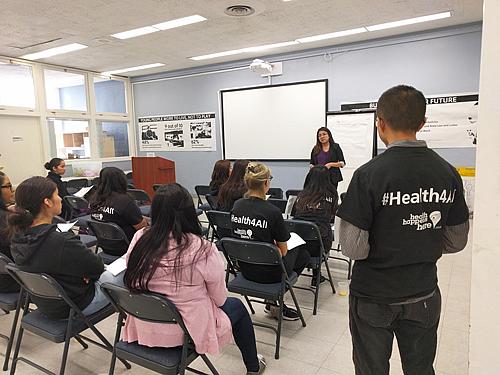Dreamers in search of affordable health care (Part 3)
The three-part series was produced as a project for the California Health Journalism Fellowship, a program of the Center for Health Journalism at the USC Annenberg School for Communication and Journalism.
Other stories in the series include:

#Health4All campaign informs the immigrant community about their options for health care services. (EGP photo by Jacqueline Garcia)
Click here for SPANISH version.
Nidia Torres says paying a penalty for not having health insurance is unfair if you can’t qualify for an affordable plan. It’s not easy to find health care coverage when you don’t even know where to start looking, she says.
Torres, 34, has Deferred Action for Childhood Arrivals (DACA) status, making her eligible for a reprieve from deportation and a work permit, but not for health insurance through the Affordable Care Act (ACA) —also known as Obamacare—due to her quasi-legal status.
Senate Bill 10 – the #Health4All Waiver – signed by Gov. Jerry Brown Friday, however, could open the door to coverage for her and other DACA recipients and people who are undocumented now excluded from ACA coverage because they are not considered lawfully present in the country.
While many cheer the legislation as a positive step toward inclusion for immigrants, its impact may be more symbolic than practical since it does not give them access to the subsidies that are often what makes coverage affordable.
#Health4All Waiver
SB 10, authored by Sen. Ricardo Lara (D-Bell Gardens), allows California to seek a federal waiver to allow undocumented immigrants and DACA recipients to use their own money to buy health insurance through Covered California, the state’s online marketplace. Under ACA, states can apply for a waiver to modify provisions of the law based on guidelines set by the U.S. Department of Health and Human Services.
“This bill presents an historic opportunity for California to become the first state in the nation to request a federal waiver,” said Sen. Lara Friday in a statement.
If approved, California’s waiver will have no financial impact on the federal government because SB10 does not allow DACA recipients or the undocumented to receive the government subsidies that lower the cost of monthly premiums.
Nevertheless, proponents see it as an important step forward, and Covered California estimates as many as 50,000 more people — who make too much money to qualify for Medi-Cal — may buy coverage through the marketplace if the waiver is approved.
Nidia Torres, mother of one, is a DACA recipient with no health coverage. (Courtesy of Nidia Torres)
Torres, a single mother of one, makes about $23,000 a year, which she told EGP is too high to qualify for Medi-Cal but not high enough to purchase insurance on her own.
“I have been wanting to go to the doctor for a physical exam but I was told it is about $100” since I don’t have insurance, she told EGP, explaining she opted to pay for a one-time visit at a community clinic rather than struggle to pay monthly for insurance. “It’s not that I don’t want to buy the coverage, but I can’t afford it,” she told EGP. SB10 will not give her access to a plan she can afford.
Lara’s spokesperson Jesse Melgar told EGP that even though subsidies are not provided under SB 10, it does fight for health care for all.
There are about 390,000 undocumented immigrants who earn too much to qualify for Medi-Cal, said Melgar. “Of those, an estimated 10% earn over 400% of FPL meaning they would not be eligible for any subsidies regardless of immigration status.”
We recognize that SB10 would make a modest change but “we think the change is still important, beyond the symbolism of inclusion and of an explicitly exclusionary policy in the ACA,” Anthony Wright, executive director of Health Access California told EGP.
With over 70% of undocumented Californians in mixed-status families, it means many will get subsidies, said Wright, citing examples of two situations where people will benefit from access to Covered California. The first involves a family of three, with the child receiving free Medi-Cal, one spouse getting subsidized coverage for about a $50 a month, and the other spouse paying about $250 a month for unsubsidized coverage.
“As a family, on their income, $300 might be a stretch, but it might be doable depending on how they prioritize it,” he explained.
Access to California’s health exchange would also benefit people who have the means to pay for coverage, like contract workers in the Silicon Valley who do not have employer sponsored health coverage, Wright said.
Covered California spokesperson Dana Howard told EGP undocumented immigrants can currently buy private health insurance, but approval of the SB 10 waiver would benefit families in mixed status making it “easier for them to purchase their service in one place.”
In an interview with California Healthline, however, insurance agent Alex Hernandez said people are not rushing to buy health care plans because of the high-cost. Hernandez calculated that a woman in her mid-20s, making about $45,000 a year, would pay $304 per month for a standard Anthem-Blue Cross plan through the exchange. If she buys that same plan directly from Anthem, it would cost $303.30, he told California Healthline.
Giving all Californians access to Covered California makes the health care system more inclusive and efficient, contends Maricela Rodriguez, a program manager with The California Endowment.
“Not all undocumented individuals will be able to afford health care through Covered California and will remain ineligible for Medi-Cal,” she told EGP in an email, acknowledging that the measure is not a total solution.
“Without the assistance of subsidies, affordability will continue to be a barrier for many. Which is why this is only a first step and why we, along with advocates and policy leaders, will continue to fight for health justice for everyone,” she said.
The federal government has 225 days to grant or deny permission.
Excluded from Obamacare? No Penalty for Not Having Insurance
In the meantime, DACA recipients and undocumented immigrants, like Torres, who were excluded from Obamacare but penalized for not having health insurance can seek a refund and exemption from future penalties.
When Torres filed her 2015 taxes through H&R Block she was penalized about $200 for not having health insurance in 2014. “I didn’t know I was exempted,” she said.
The Covered California website states that DACA recipients and undocumented immigrants are eligible for an exemption to the tax penalty for being uninsured.
Not every tax preparer is aware of the exemption, however, and many will just have their clients pay the penalty. It’s important for DACA recipients to explain their status to their tax preparer before they file, says Elba Schildcrout, Community Wealth Dept. director and tax preparer at East LA Community Corporation (ELACC).
ELACC partners with Volunteer Income Tax Assistance (VITA)—an Internal Revenue Service program to help low- and moderate-income taxpayers file returns at no cost.
Once DACA recipients have disclosed their status, tax preparers must file Form 8965 Health Coverage Exemptions along with their 1040 tax return.
DACA recipients who previously paid the penalty can file an amendment to get their money back, said Schildcrout.
The process is doable, she said, but added that tax preparers usually charge to file the amendment.
It’s sad to see clients pay for an amendment to a tax return that was done wrong, she told EGP.
According to Schildcrout, the VITA program can help DACA recipients who were charged a penalty for not having health insurance to file the amendment at no cost.
[This story was originally published by EGP News.]

